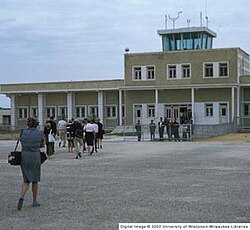Mazar-e Sharif International Airport
|
Mazar-e Sharif International Airport میدان هوائی مزار شریف |
|||||||||||
|---|---|---|---|---|---|---|---|---|---|---|---|

Mazar-i-Sharif Airport in 1969
|
|||||||||||
| Summary | |||||||||||
| Airport type | Civilian/Military | ||||||||||
| Owner |
|
||||||||||
| Operator |
Ministry of Transport and Civil Aviation Ministry of DefenseMinistry of the Interior International Security Assistance Force (ISAF) |
||||||||||
| Serves | Northern Afghanistan | ||||||||||
| Location | Mazar-i-Sharif, Afghanistan | ||||||||||
| Elevation AMSL | 1,287 ft / 392 m | ||||||||||
| Coordinates | 36°42′25″N 67°12′34″E / 36.70694°N 67.20944°ECoordinates: 36°42′25″N 67°12′34″E / 36.70694°N 67.20944°E | ||||||||||
| Map | |||||||||||
| Location of airport in Afghanistan | |||||||||||
| Runways | |||||||||||
|
|||||||||||
|
Sources: Landings.com, AIP Afghanistan
|
|||||||||||
Ministry of Transport and Civil Aviation
Mazar-e Sharif International Airport (Persian: میدان هوائی مزار شریف) (IATA: MZR, ICAO: OAMS), locally known as Mawlānā Jalāl ad-Dīn Muhammad Balkhī International Airport, is located 9 km east of Mazar-i-Sharif in northern Afghanistan, a journey of 15 minutes by taxi from the center of the city. It comes with a dual-runway capable of handling large aircraft such as Boeing 747, Boeing C-17 Globemaster III and Antonov An-225. The airport has facilities for up to 1,000 passengers, making it one of the largest airports in Afghanistan.
Originally built by engineers from the Soviet Union in the 1950s, the airport serves the Afghan population north of the country. A new 60 million euro terminal was added to the airport in recent years while the older terminal is now used for domestic flights.
Mazar-i-Sharif airport was built in the 1950s by assistance from the Soviet Union during the Cold War, when the Soviets and the Americans were trying to spread their influence in the Middle East and South Asia. Between the 1960s and late 1970s, for the first time large number of tourists began arriving to see historical places in the city.
The airport was heavily used in the 1980s by the Soviet forces from which it launched daily flight missions to hit targets in the Mujahideen controlled territories of the southeast. It also served as one of the main hubs for deploying troops from the neighboring former Soviet Union.
...
Wikipedia

